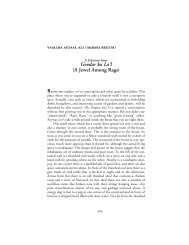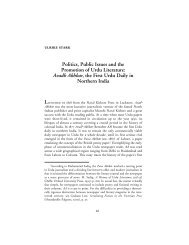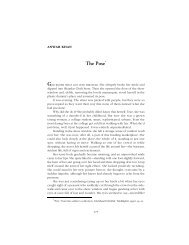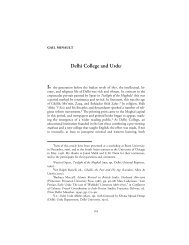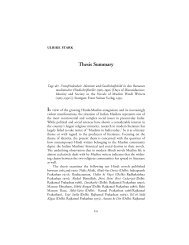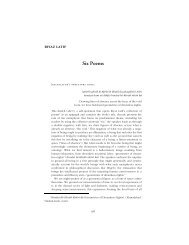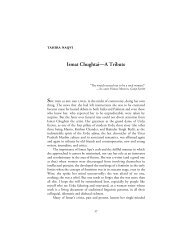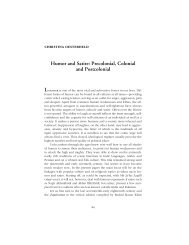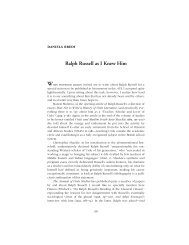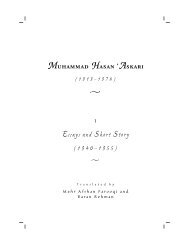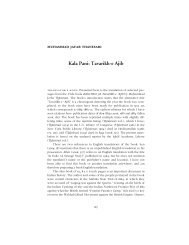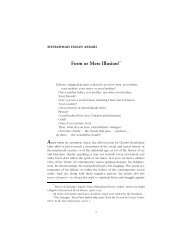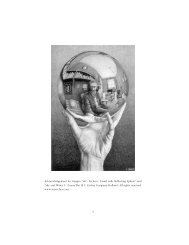Echoes and Exuberances: Baidar Bakht's Recent Translations of ...
Echoes and Exuberances: Baidar Bakht's Recent Translations of ...
Echoes and Exuberances: Baidar Bakht's Recent Translations of ...
You also want an ePaper? Increase the reach of your titles
YUMPU automatically turns print PDFs into web optimized ePapers that Google loves.
CARLO COPPOLA • 153“Naheed, let my belief suffocate a little bit more. / A storm usuallyemerges from calm winds” (p. 5).A significant image in these early poems, <strong>and</strong> even some <strong>of</strong> the laterones such as “Recompense” (p. 32), is laughter, which is presented almostas defiance to the tears that are stereotypically expected <strong>of</strong> women; this isa laughter not born out <strong>of</strong> humor, but seems rather to be the onlyalternative to the anguish inherent in the human condition.In subsequent volumes <strong>of</strong> poetry, Naheed turns her focus away fromthe human condition as a whole <strong>and</strong> concentrates a good deal <strong>of</strong> herattention on the condition <strong>of</strong> women. In the poems <strong>of</strong> B®n≥m Mus≥fat(Nameless Distance; 1971) <strong>and</strong> Galy≥, D^∑p, Darv≥z® (Lanes, Sunshine,Doors; 1978) the poet seems to have found her distinctive voice, onewhich becomes trenchant, impatient, admonishing (to both men <strong>and</strong>women), <strong>and</strong>, to the thinking <strong>of</strong> some men (including some malemembers <strong>of</strong> the literary establishment) <strong>and</strong> some women, shrill <strong>and</strong>unladylike.Several major themes occur in these works. First, a dem<strong>and</strong> for trueequality for women, especially in the form <strong>of</strong> choices; that is, womenshould have choices in their lives, many more than they now have. This isbasically a call for change in the power structure <strong>of</strong> male-femalerelationships, which, in turn, will effect pr<strong>of</strong>ound change at all levels <strong>of</strong>society.Second, all people, but especially men, should recognize theachievements <strong>of</strong> women, whether that achievement is a poem, an <strong>of</strong>ficejob, a comfortable middle-class home, or giving birth to a child; acorollary to this is that women celebrate <strong>and</strong> acknowledge as martyrsearlier women persecuted by men: Anarkali, the dancing girl who waswalled-in alive for her relationship with the prince who would eventuallybecome the Mughal emperor Jahangir; Qurratulain Tahira, the Iranianpoet who was strangled for her unorthodox (read: feminist) views onreligion; <strong>and</strong> the various tragic heroines <strong>of</strong> Indian literature: Noori, Sassi,Sohni, <strong>and</strong> Heer.Third, <strong>and</strong> very centrally, men ought to grow up emotionally <strong>and</strong>assume their share <strong>of</strong> the burden <strong>of</strong> relationships, whether marriage oreven love affairs; a corollary here is that relationships require attention<strong>and</strong> work, that they don’t just happen, <strong>and</strong> merely because women seembetter equipped emotionally to h<strong>and</strong>le them than men, women are not tobe the sole caretakers <strong>of</strong> such relationships. Merely to acknowledgewomen’s superiority here does not get men <strong>of</strong>f the hook.And fourth, change is a frightening thing, not only in terms <strong>of</strong>



